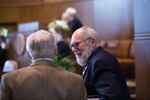It's barely been a month since the Oregon Court of Appeals ruled that the process to disincorporate the city of Damascus was flawed. But in that brief time, several of the city's remaining city councilors have reconstituted as a deliberative body, appointed a mayor, and enlisted the services of a volunteer city manager. At the same time, people who have felt the disincorporation of Damascus should be allowed to stand have doubled-down on efforts to stop the city from reforming by leaning on state legislators to intervene.
Related: To Re-Dissolve Damascus, Clackamas County Looks To Salem
Damascus has been a reluctant city since it formed in 2004, in response to the Metro regional government's effort to include the mostly rural community into the Portland area's urban growth boundary. Voters preferred their own city leaders to guide the community's growth, rather than nearby Happy Valley or Gresham. But in the years that followed, residents struggled to agree on a long-term growth plan and infighting reigned on city council. In 2013 and 2016, majorities of participating voters cast ballots to disincorporate, but both times, the vote was considered invalid.
The fate of the city-or-not in Clackamas County fell to the Senate Rules Committee Monday, just as the legislature heads into its final weeks before sine die.
Leading the charge to dissolve the city once and for all was Clackamas County commission chair, Jim Bernard. The commission wrote to legislators last week, calling on them to intervene.
Bernard explained to the rules committee that the remaining Damascus city funds had been spent on city services provided by Clackamas County, with millions being refunded to taxpayers. He said development was imminent on its western edge, after annexation by neighboring Happy Valley.
“To the degree which Damascus had been completely dismantled means that it’s simply not possible to restore the city to its pre-disincorporated status,” Bernard said.
On the other side was James DeYoung, the lead plaintiff in the case that declared the 2016 disincorporation invalid, and the just-appointed mayor of Damascus. He compared the fate of Damascus to that of a wrongly convicted defendant.
“Like a person falsely accused and sent to prison for three years, and then because of evidence coming forward is set free from prison, Damascus is finding the road ahead quite difficult, but not impossible,” DeYoung told legislators.
In 2013, a majority of voters who cast ballots had agreed to disincorporate, but they fell short of the unique Oregon mandate for disincorporating a city: that a majority of all eligible voters had to agree to dissolve, not just a majority of voters who cast ballots in that election. Legislators thought they’d fixed that in 2015 by offering a referendum, allowing Damascus voters to disincorporate with a simple majority of participating voters. But the Oregon Court of Appeals said that approach was flawed.
After Clackamas County chair Bernard pleaded his case to the rules committee, Sen. Arnie Roblan, D-Coos Bay, questioned him about this latest attempt to dissolve Damascus.

Democratic Oregon state Sen. Arnie Roblan speaks with a fellow state senator before the Oregon Senate convenes at the Oregon Capitol in Salem, Ore., Tuesday, April 2, 2019.
Bryan M. Vance / OPB
“I just want to make sure — have we checked the language, so that we don’t end up in court again, to find out [if] it works?” Roblan asked.
“I’ve never been a lawyer,” responded Bernard, drawing a laugh from Roblan.
“I just want to make sure — I thought we did a good job the last time,” Roblan said. “Obviously, we were wrong.”
The proposed bill, Senate Bill 226, would not lead to a third vote, but instead would set into a statute that the vote taken in 2016 was a valid decision to disincorporate Damascus.
But the debate in front of the rules committee was less about how to disincorporate and more about whether that was the appropriate response to the court ruling.
DeYoung argued it was not. He saw instead, a chance to “resurrect” the city.
“In the history of Oregon, no city has ever suffered ill-treatment to the degree that Damascus has,” DeYoung said. “But we’re alive again and never before in history has a city been resurrected.”
Others who have endured the years of difficulty and dysfunction in Damascus, though, argued it was time to shutter the city completely. And the testimony gave insight into the conflicts that marked Damascus city government for years.
Former Damascus Mayor Diana Helm questioned the legal standing of the month-old Damascus city council, arguing the councilors have taken steps that aren’t necessarily supported by the Appeals Court decision, which remanded the case back to the circuit court.
Helm said it would be absurd to bring the city back, after civic resources, including tax money, have already been liquidated.

James De Young successfully sued the state of Oregon over a 2016 disincorporation vote, which the Court of Appeals ruled in May was invalid. De Young is trying now trying to re-form a city in the fractured community.
Allison Frost / OPB
“Are we going to ask people to write checks back to Clackamas County? Ask for staplers, desks and cubicle walls to be returned? The thought of trying to start over would be comical were it not for the potential madness that would ensue,” Helm argued.
DeYoung accused disincorporation backers of being anti-government “grave robbers.” DeYoung was joined by two other city supporters who argued it was possible for a new city government to tackle the practical difficulties. DeYoung touted a 10-point plan, including promises of a low tax rate to build local support for a reformed city.
The meeting wrapped up without the rules committee taking action.
Longtime Damascus resident Chris Hawes left legislators with a different death analogy, as the meeting closed.
“We’re not trying to cause problems,” Hawes told legislators.
“Let Damascus go peacefully.”
